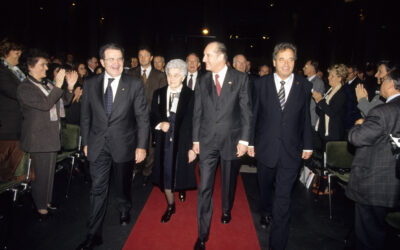 Klaus Hemmerle, once the bishop of Aquisgrana, was a brilliant theologian and philosopher who left a mark because of his notable contribution and deeper doctrinal understanding of the charism of unity, as well as its spreading among bishops. The visit by Focolare president Maria Voce to Aachen, Germany, on May 11th,,2013, was to pay homage to Bishop Hemmerle and the influence he had on the theology and life of the Church and of society: “Chiara Lubich inspired him and she allowed herself to be inspired by him,” Maria Voce affirmed as she described the relationship between the German theologian and the Focolare Movement. Chiara Lubich considered him to be one of the co-founders of the Movement.
Klaus Hemmerle, once the bishop of Aquisgrana, was a brilliant theologian and philosopher who left a mark because of his notable contribution and deeper doctrinal understanding of the charism of unity, as well as its spreading among bishops. The visit by Focolare president Maria Voce to Aachen, Germany, on May 11th,,2013, was to pay homage to Bishop Hemmerle and the influence he had on the theology and life of the Church and of society: “Chiara Lubich inspired him and she allowed herself to be inspired by him,” Maria Voce affirmed as she described the relationship between the German theologian and the Focolare Movement. Chiara Lubich considered him to be one of the co-founders of the Movement.
Maria Voce had been invited to visit the current bishop of Aachen in the morning, Bishop Heinrich Mussinghoff. They then travelled together to the Cathedral where they paid a visit to Hemmerle’s tomb. In the afternoon a small group of members of the Central German Catholic Committee, who were Hemmerle’s collaborators, met in what had once been his home.
Among these were Matthias Sellmann, professor of Pastoral Theology at Bochum, and Claudia Lucking-Michael, vice president of the Central Committee and General Secretariat of the Opera di Cusanus – an association that awards scholarships to students of merit. They presented two brief talks on the figure of Bishop Hemmerle. The second part of the program included testimonies by people who knew the bishop personally.
“His theological thought and his influence on our work in the committee of German Laity have produced much fruit that has reached far beyond his earthly life,” declared Claudia Lucking-Michel who met Hemmerle only once, but had studied his thought and was deeply influenced by it. She described him as a bridge-builder at so many levels, someone who had motivated her to reflect on the meaning of life and of death.
 A great master at teaching a Christianity that was convincing is the way Matthias Sellmann described Hermmerle in his presentation, underscoring Hemmerle’s plural thinking. According to Sellman he was one of those avant-garde thinkers: “He always placed himself in the position of a learner and was convinced that theology always had more than one source. Hemmerle was able to explain the Trinity to you in a way that made you want to live it!” He was a great sage – Sellmann went on – who was able to explain great theorems in a way that was simple.
A great master at teaching a Christianity that was convincing is the way Matthias Sellmann described Hermmerle in his presentation, underscoring Hemmerle’s plural thinking. According to Sellman he was one of those avant-garde thinkers: “He always placed himself in the position of a learner and was convinced that theology always had more than one source. Hemmerle was able to explain the Trinity to you in a way that made you want to live it!” He was a great sage – Sellmann went on – who was able to explain great theorems in a way that was simple.
“We are thankful for having had him among us. And we’ll manage to understand the scope of his theology perhaps only in the future,” affirmed the current bishop of Aquisgrana Heinrich Mussinghoff. He continued: “We can learn from him how to think in a new way about the faith, how to live and tell it in a new way.”
During a discussion among the participants some interesting ideas highlighted what could be done to help secure that the heredity of Hemmerle would continue to bear fruit in the future: a study of the language that is “both unique and easy to understand” was suggested by Prof. Michael Albus who did his doctorate with Klaus Hemmerle; promoting an award among researchers who study the grand themes of Hemmerle’s work; Claudia Lucking-Michel suggested launching an exchange program for collaborators and leaders in ecclesial environments.
Overall, what emerged was the significance of the figure of Bishop Hemmerle for both theology and the life of the Church not only in the Germany of his time, but for ecclesiastical perspectives of today and the future.




0 Comments